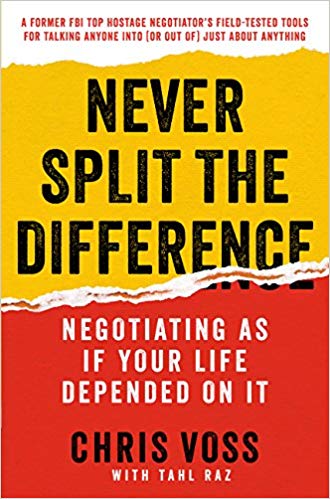You have /5 articles left.
Sign up for a free account or log in.
 Never Split the Difference: Negotiating As If Your Life Depended On It by Chris Voss and Tahl Raz
Never Split the Difference: Negotiating As If Your Life Depended On It by Chris Voss and Tahl Raz
Published in May of 2016.
Everything is a negotiation. And most of the advice we’ve been given about negotiating is wrong.
Those are the two core messages that the FBI’s former top international hostage negotiator, Chris Voss, seeks to impart in Never Split the Difference.
The idea that we should approach social interactions as negotiations will feel distasteful to many. According to Voss, that is because we misunderstand what a negotiation is.
A negotiation, at its root, is an opportunity to share information. The way that each negotiation should be approached is through a commitment to empathy.
It is not necessary that you agree with anything that your negotiation partner says, thinks or does. What only matters is that you can listen intently, and then communicate in a way that demonstrates that you are hearing what matters to your partner.
Never Split the Difference provides the reader with a series of straightforward and actionable negotiating strategies. Each chapter starts with an example from Voss’ career negotiating for the release of hostages, and then applies those lessons to business and personal settings.
We learn about the power of mirroring, which is basically as simple as repeating back what your negotiating partner is saying. Other lessons include why it is better for your negotiating partner to say “no” rather than yes, as no provides both new information and a firm place to start.
In any negotiation, you never want your partner to say “your right” - as that is an easy way to signal agreement without commitment. What you want to hear is “that’s right,” as those words indicate that your partner has internalized a shared point.
In reading Never Split the Difference, I kept wondering how FBI hostage negotiations would hold up to the brutal reality of academia?
Securing the release of hostages from bank robbers and terrorists is one thing. Negotiating committee assignments and teaching schedules are orders of magnitude more difficult.
I do have a serious higher ed reaction to this book. And that reaction is “wow.”
Learning how to negotiate effectively seems like the most important set of skills that so many of us in academia should build. And yet, in all my years of attending numerous higher education professional development workshops and events, I’ve never had systematic training in negotiation. Have you?
Nor did I receive any formal training in negotiation in grad school.
As alternative academics, most of our work involves negotiating. Our days are spent trying to understand the needs and goals of our campus partners - and then translating those goals into actions, programs, and initiatives.
Alternative academics rarely, if ever, do anything on our own. All of our academic work is with professors, other non-faculty educators, and campus organizations. We can only be effective in moving things forward if we can contribute to other people on campus reaching their goals.
Asking my online education and learning innovation communities, should we stop talking so much about what we are doing on our campuses, and start spending our conference/convening time on getting trained up in negotiations?
Programs in negotiation seem to be mostly aimed at the business and executive communities. Therefore, they are expensive.
Reading Never Split the Difference is a great place to start. But I suspect that building effective negotiation muscles will take more than a single book - no matter how good that book might be.
What has been your formal training in negotiation?
What books on effective negotiation practices would you recommend?
What are you reading?




